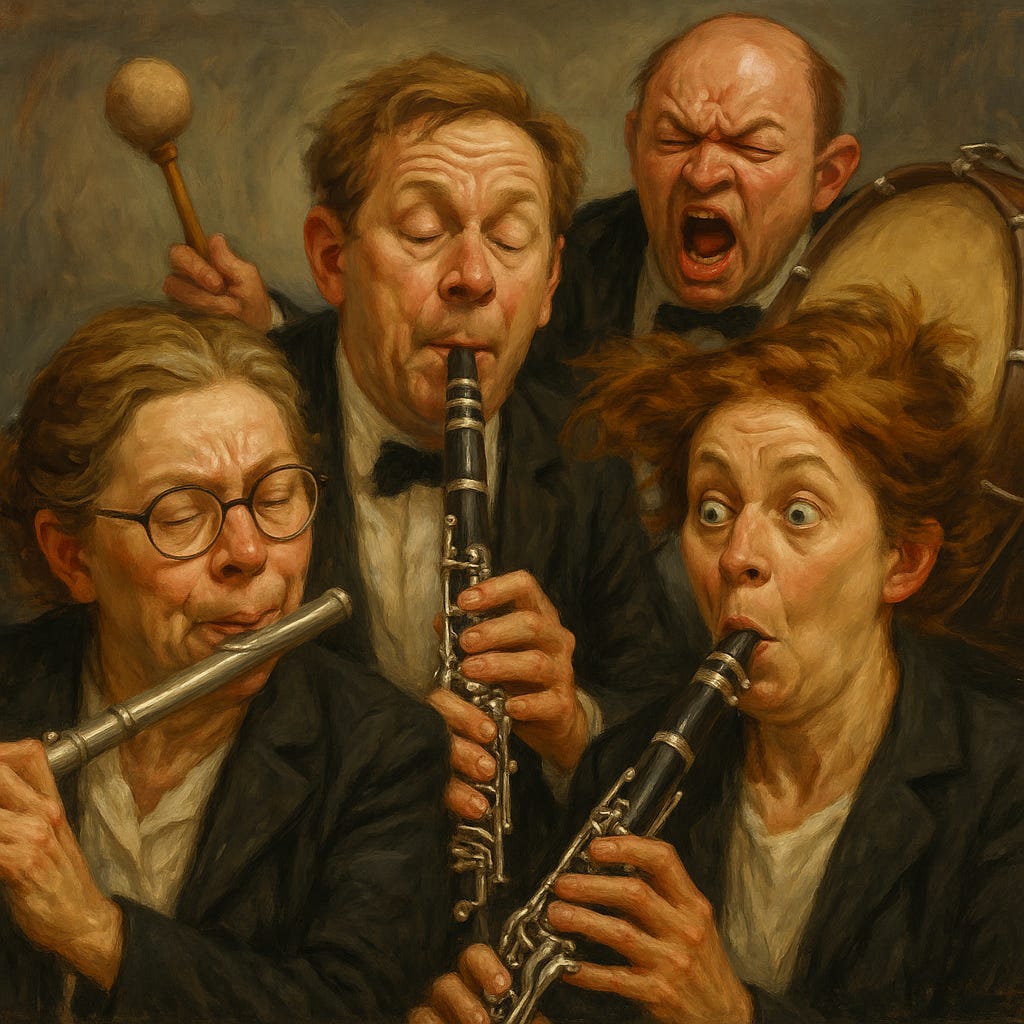The Tyranny of Empathy: How DEI and Human Rights Offices Became Engines of Prejudice
MLK talked about the Arc of the Moral Universe moving toward justice. I think it needs some bending.
If you believe in free speech, here’s the bad news: it isn’t actually free. It costs $5 a month. That’s less than the latte you complain about, less than the Netflix shows you’ll never watch, and far cheaper than your last regrettable bar tab.
For that, you get three essays a week, open comments, and the satisfaction of knowing you’re funding uncensored writing in a world addicted to censorship. Everyone says, “It’s just a cup of coffee.” Fine. But here’s the pitch: give me your coffee money and I’ll hand you something stronger—essays with bite, arguments with teeth, and the freedom to say what others won’t.
Subscribe today. Because silence is free—and it’s worth exactly what you paid for it.
Written in Nov. 2024, rewritten in Sept. 2025
False Empathy, Real Prejudice — The Burden of Doubt
They say empathy will save us. It will not. Empathy, as presently practised by the clerisy of grievance, is an industrial process: a well-oiled theatrical gesture designed to make the giver feel good and the receiver feel managed rather than helped. Put differently: empathy lubricates the social conscience; it rarely repairs structural wrongs. Today’s pilgrim-mobs and seminar rooms exhume a counterfeit empathy that is performative, doctrinaire, and—what is worse—selective.
Walk with me a simple mile through a grocery store refund counter. A man—a Black man, or a man wearing a kippah—approaches with a receipt and a clean intent. The refund should be a five-minute transaction. Instead, it’s an hour of delays, pointless queries, and tiresome cross-checks, a clerk brandishing procedure the way a coward brandishes a shield. No slur is uttered; no insult is spelt out. The words “Jew” or “Black” never appear. Yet the man leaves with his money and something worse: a throb of doubt that will not depart. Was this disdain mere incompetence, or the soft, domesticated version of prejudice—the quiet, efficient humiliator of a citizen’s dignity?
That gnawing doubt is itself a harm. It corrodes the agency the way acid corrodes iron. You cannot move through a free country if every slight becomes an existential question: was I treated this way because of my race, creed, or the symbol at my throat? To live inside that uncertainty is to suffer a second injury, in addition to any original affront. And that is precisely the lacuna that modern DEI initiatives and their adjuncts—the university “human rights” bureaus—refuse to address. They produce rituals and mediations; they do not restore dignity. Worse, they institutionalise a foul economy of grievance wherein the vocabulary of suffering is commodified and performative gestures substitute for the hard work of impartial justice.
From this psychological limbo, there are two grim exits. The first is paranoia—not clinical delusion, but the posture that suspects bias in every interaction and is rewarded for announcing it. The second is brittle denial, a cheerful stoicism that tells the target to “get over it” and become a model of docile resilience. The first invites bitterness; the second invites erasure; both are forms of dispossession.
Empathy is overrated because it is easily counterfeited. The white-saviour industrial complex trades in empathy like a false currency. As Teju Cole coolly observed, it is a machine for validating the helper: a large emotional experience purchased on somebody else’s life. The white saviour gets to be benevolent; the beneficiary gets a story. Win-win for vanity; bankruptcy for agency. Hence the endless panel discussions, listening tours, and lachrymose emails from provosts promising “healing”—all of it exquisitely calibrated to do nothing except reassure the institution that it feels deeply.
DEI pretends a neat arithmetic: add diversity, subtract grievance. The truth is more baroque—and more damning. Diversity without standards is bean-counting; equity as identical outcomes is a euphemism for suspending merit; inclusion as quota is a bureaucratic catechism that teaches everyone to doubt competence—the resulting apparatus slides, with the frictionless grace of a greased chute, into reverse discrimination. In the name of fairness, it politicises hiring; in the name of “inclusion,” it makes excellence suspect; in the name of “safety,” it polices thought. And the irony—the sin—lies here: these instruments, ostensibly designed to frustrate prejudice, so often become weapons of it, especially against Jews, who have long laboured under the oldest and most adaptable hatred on earth.
The Jew’s predicament is not interchangeable with ordinary bigotry. Anti-Semitism has metaphysical ambitions: not merely insult or exclusion, but extinction. That is not a rhetorical flourish. “Death to Jews” can be heard again in civil squares; the antique blood libel finds new hosts on the fashionable left and the rancid right; conspiracy mutters through respectable institutions in a new jargon. This is why the Jew’s doubt at the refund counter is heavier than most: history has taught him that the minor indignity may be the prelude to the major catastrophe.
Meanwhile the campus “human rights” offices—sloshing with therapeutic jargon and enthroned on the words “harm” and “safety”—have forgotten the first duty of rights: impartiality. They police speech selectively, rush to punish certain opinions, and remain curiously tolerant of explicit dehumanisation from quarters that flatter their politics. The result is a grotesque inversion: the supposed guarantors of liberty become its bureaucratic enemies.
Consider the petty humiliations that accumulate into a ledger. The grocery counter. The manager who “just follows policy.” The student sanctioned for an imprecise phrase while faculty members retweet open incitement. Or this: a man pulled over for a trivial speeding infraction, given no break, and saddled with a second, obscure ticket for a clear cover over his licence plate—an offence he has never heard of, a cover many of his (mostly non-Jewish) friends also use without incident. No epithet is spoken; the point is made. The law, elastic for some, becomes wire-tight for others.
Now to the band—the orchestra that always strikes up when there’s prestige in pity. Picture them tuning: the NGO director with the imperial lanyard; the tenured professor with the permanent frown; the TV moralist selling indignation by the ounce. Their anthem is empathy; their business model is grievance.
They will lecture on structural racism while stepping daintily around the new-old anti-Semitism erupting in the quads; they will march against one bias and excuse another if it suits the tribe. When the band starts up, notice who grabs the baton. The white saviours stand in the woodwinds, sighing in perfect time. The race-baiters—entrepreneurs of resentment—hammer the drums. A race-baiter, for the avoidance of doubt, is the professional who converts every policy dispute into a racial catechism; who elevates anecdote to theory; who lives on outrage and retweets. They do not build institutions; they perform them. They do not solve; they stoke. Their currency is provocation, their dividend attention.
And the universities? Witness the Canadian episodes that have corroded public trust. On several campuses, chants and placards appeared that no civil society should stomach; administrations responded not with the brisk enforcement of neutral rules but with equivocation and weasel words.
Student unions that discover iron moral clarity about microaggressions suddenly find nuance when the target is Jewish. School boards erect DEI bureaucracies that lecture on “lived experience,” then somehow contrive to miss the Jewish experience entirely. York’s disgraceful scenes, the Toronto District School Board’s selective vigilance—these are not isolated embarrassments; they are symptoms of a captured culture. The guardians of learning forgot how to teach people to think; they taught them instead to shudder at thought.
Yes, there are legitimate cases of overreach and punishment that deserve union defence; yes, some sanctions are unjust. But the asymmetry is unmistakable. A paramedic who posts an explicitly bigoted lie can find a chorus of defenders in the name of “context” and “speech.”
At the same time, a professor who states a historically accurate judgment about a fascist movement is gagged, suspended, and defamed. This is not justice; it is tribal enforcement masquerading as care. You cannot credibly claim impartiality while running two rulebooks.
Against this hypocrisy, the sermonising about empathy sounds tinny. What is needed is not more tear-jerking but more spine.
The remedy for the burden of doubt is not a circle of therapeutic chairs but the restoration of evenhandedness: clear rules, applied equally, with consequences for defamation and impunity alike. It is dull work—humdrum, procedural, legalistic—and therefore beneath the attention of the self-anointed empathisers. But it is the only work that secures dignity.
Permit a confession about loneliness, because here the counterfeiters of empathy are most eager to pounce. Human empathy is often limited and can be misleading. We are, each of us, sovereign in our skulls—complex organisms accreted from genes and accidents. No human being can wholly enter another’s grief, and the attempt—when it becomes a performance—can sting worse than silence. There is a kind of pity that is a theft: it steals agency while pretending to bestow it. Better the honest limits of sympathy than the profuse kisses of a counterfeit friend.
Yet the loneliness needn’t be terminal. There is consolation—call it religious, if you like—in the stubborn belief that truth exists, that justice is not a costume, and that institutions can, when bullied by courage, remember their purpose. The line so often quoted—that “the arc of the moral universe is long, but it bends toward justice”—is neither a guarantee nor a law of nature. It is an instruction: bend it. Do the unglamorous things—collect facts, enforce rules, punish libel, protect speech, drop the tribal scales. Stop deputising bureaucrats to administer feelings and return them to administering fairness.
Barack Obama often quoted Martin Luther King Jr., who in turn borrowed from the abolitionist preacher Theodore Parker, who drew inspiration from the Stoics: “The arc of the moral universe is long, but it bends toward justice.”
It is a stirring line, which is why it is so often repeated, embroidered on posters, and whispered like scripture.
But it is also false.
There is no cosmic curvature pulling us toward decency. History shows us instead that the arc bends toward the zeitgeist, toward whatever superstition, fad, or tribal passion happens to dominate the hour.
In the 1930s, it bent toward jackboots; in the 1970s, toward Maoist kitsch; today, it bends toward the pieties of DEI and its bureaucratic clergy. Justice is not gravity. It does not bend of its own accord. It must be bent by pressure, by courage, by argument, by law. To pretend otherwise is not hope but narcotic.
So let the band play. Let the white saviours have their hymn and the race-baiters their drum solo. We will keep our ears open for another music: the prosaic rhythm of due process, the unfashionable melody of equal standards. We will insist that the human-rights offices act like courts and not cults; that universities teach argument rather than choreograph outrage; that unions defend rights rather than curate ideologies; that police apply law rather than mood; that managers stop hiding behind policies the way cowards hide behind curtains.
If the guardians of education cannot do this, they have vacated their trust. If the guardians of rights cannot put politics aside, they have abandoned the people they pretend to serve. The burden of doubt—real, grinding, personal—will not be lifted by ever more elaborate empathy rituals. It will be lifted by unglamorous, stubborn fairness. And until that returns, the rest is theatre.
If you want to please live a tip, after being fired for calling Hamas Nazis, I have lost over $2,000,000 in future earnings, and have had my income cut about 90%. I am not starving, though; the mortgage will be paid—no expectation beyond a $5 a month subscription.
_______________________________________________________________________






